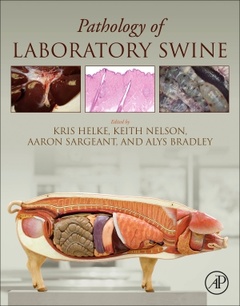Pathology of Laboratory Swine
Langue : Anglais
Coordonnateurs : Helke Kris, Nelson Keith, Sargeant Aaron M., Bradley Alys

Pathology of Laboratory Swine is a comprehensive text describing the spontaneous pathology seen in common laboratory pig strains. As the first book collating information on all organ systems in these strains, this resource will serve as a ?go to text for all pathologists working on laboratory pigs in safety assessment studies and for veterinary pathologists who need a diagnostic tool to rule out spontaneous, non-clinical disease pathology when assigning cause of death to these animals which are also kept as domestic pets.
1. Choice of Pig model
2. Regulatory issues in the use of minipigs
3. Infectious Diseases
4. Clinical Examination
5. Digestive System (Oral Cavity, Salivary glands, Esophagus and Stomach, Small and Large Intestine
6. Liver
7. Exocrine Pancreas
8. Urinary System (Kidney, Urinary bladder, ureter, urethra
9. Nervous System
10. Eye and associated glands
11. Skeletal Muscle
12. Bone and Joints
13. Skin and subcutis (including specialized sebaceous glands)
14. Mammary Gland
15. Respiratory trac
t16. Haemopoietic and Lymphoid System
17. Female Reproductive Tract
18. Male Reproductive Tract
19. Cardiovascular System
20. Endocrine System (Thyroid, Parathyroid, Pituitary, Adrenal and Endocrine Pancreas
21. Clinical Pathology (Hematology and Clinical Chemistry)
22. Juvenile
23. Immunohistochemistry
2. Regulatory issues in the use of minipigs
3. Infectious Diseases
4. Clinical Examination
5. Digestive System (Oral Cavity, Salivary glands, Esophagus and Stomach, Small and Large Intestine
6. Liver
7. Exocrine Pancreas
8. Urinary System (Kidney, Urinary bladder, ureter, urethra
9. Nervous System
10. Eye and associated glands
11. Skeletal Muscle
12. Bone and Joints
13. Skin and subcutis (including specialized sebaceous glands)
14. Mammary Gland
15. Respiratory trac
t16. Haemopoietic and Lymphoid System
17. Female Reproductive Tract
18. Male Reproductive Tract
19. Cardiovascular System
20. Endocrine System (Thyroid, Parathyroid, Pituitary, Adrenal and Endocrine Pancreas
21. Clinical Pathology (Hematology and Clinical Chemistry)
22. Juvenile
23. Immunohistochemistry
Kristi Helke received her DVM in 2000 from the University of Wisconsin- Madison and completed a Fellowship from 2001-2005 in Veterinary Comparative Pathology at the Johns Hopkins University School of Medicine. She also obtained a Ph.D. in 2007 from Johns Hopkins University School of Medicine. Her pathology residency was also completed at Johns Hopkins University, and she is a diplomate of the American College of Veterinary Pathologists. Dr. Helke is currently a professor and Chair of the Department of Comparative Medicine at the Medical University of South Carolina. While there, she has completed several studies for biomedical companies in which she evaluated mice, rats, dogs and pigs for toxicologic changes to novel therapeutics and adverse reactions to both biomedical materials and devices. She also works closely with researchers to develop animal models and pathologic analysis of these models.
Keith Nelson has over 15 years experience in toxicologic pathology, working for multiple contract research organizations. He completed his undergraduate and DVM degrees at Michigan State University before spending a year at Oregon State University studying fish immunology and a year in Kenya studying hyena behavior. He then completed his residency and PhD training at Colorado State University, after which he joined MPI Research, intending to “try out toxicologic pathology. Almost two decades later, he remains excited about the field and has served as a pathologist, leader and mentor at large CROs, and adjunct assistant professor at Michigan State University. He is active within the field of anatomic and toxicologic pathology, holding multiple committee leadership positions in STP and ACVP, serving on the INHAND Minipig committee for harmonization of nomenclature, and publishing and presenting on a wide range of pathology topics.
Aaron M. Sargeant is a Scientific Director, Pathology at Charles River Laboratories in Spencerville, OH, USA.
Dr. Bradley has been with
Keith Nelson has over 15 years experience in toxicologic pathology, working for multiple contract research organizations. He completed his undergraduate and DVM degrees at Michigan State University before spending a year at Oregon State University studying fish immunology and a year in Kenya studying hyena behavior. He then completed his residency and PhD training at Colorado State University, after which he joined MPI Research, intending to “try out toxicologic pathology. Almost two decades later, he remains excited about the field and has served as a pathologist, leader and mentor at large CROs, and adjunct assistant professor at Michigan State University. He is active within the field of anatomic and toxicologic pathology, holding multiple committee leadership positions in STP and ACVP, serving on the INHAND Minipig committee for harmonization of nomenclature, and publishing and presenting on a wide range of pathology topics.
Aaron M. Sargeant is a Scientific Director, Pathology at Charles River Laboratories in Spencerville, OH, USA.
Dr. Bradley has been with
- Consists of multi-author chapters arranged by organ systems
- Provides color illustrations that depict the most common lesions to augment descriptions
- Presents pathologists with common terms that are compliant with the FDA’s Standard for Exchange of Nonclinical Data (SEND) guidelines
- Gives references for recommended tissue trimming planes
Date de parution : 11-2024
Ouvrage de 625 p.
21.4x27.6 cm
Thème de Pathology of Laboratory Swine :
Mots-clés :
Pathology; Spontaneous; Minipig; Laboratory; Gottingen; Yucatan; Hanford; Sinclair; Swine
© 2024 LAVOISIER S.A.S.



